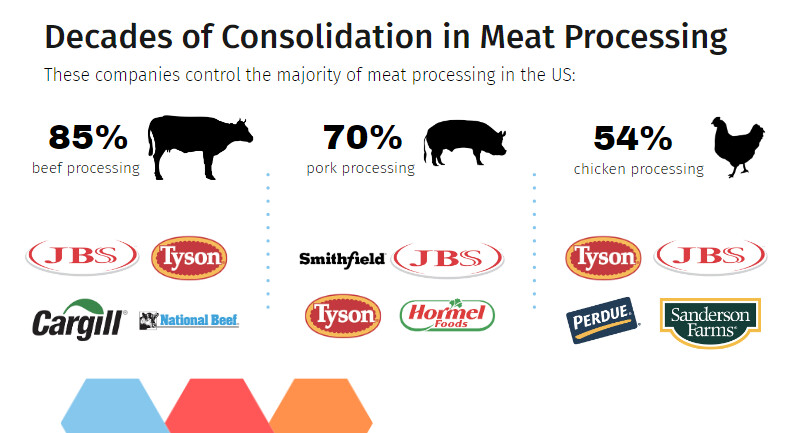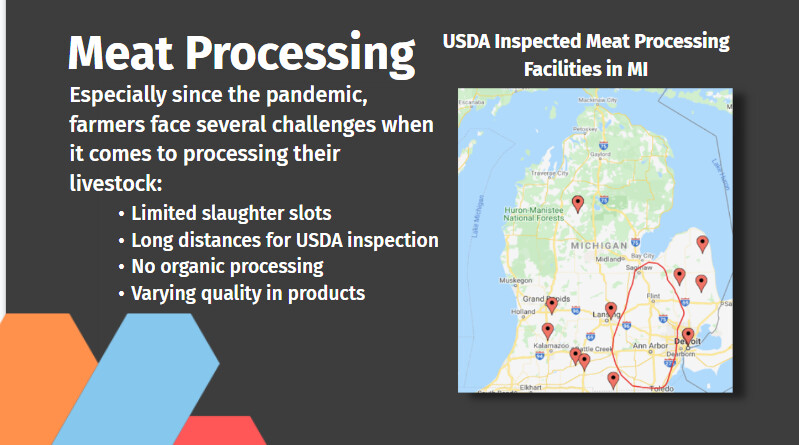Image


The problem has been around for some time, but when the COVID pandemic and shutdown hit it became even more of an issue, especially for local farmers and others who support small farms.
Now they are working even harder to get the word out and find solutions.
As part of this effort, a town hall meeting was held on Feb. 16, at Webster Township Hall. It was called “Small Farm Meat System in Southeast Michigan: Challenges, Opportunities, & Action.”
Over 100 people attended. They were local speakers at the town hall, all from Washtenaw County. A slide presentation was given.
One slide summed up the problem: “Our Meat Value Chain is Vulnerable & Broken.”
One speaker at the town hall was Wendy Banka, who is with Mighty Fine Poultry Processing and Swift Run Station. She founded a local slaughterhouse/processing facility in Pittsfield Township in an effort to bring more options to local chicken farmers when it comes to getting their local meats out to potential customers.
The Sun Times News (STN) followed up with the speakers at the town hall.
Of the town hall, Banka said, “I think the main takeaway is that a local meat system requires a nearby meat processing facility. Without a local meat processing facility we can’t have local meat. It's as simple as that.”
 This graphic was presented at the town hall. image courtesy of the planners of the Local Small Farm Meat System Town Hall
This graphic was presented at the town hall. image courtesy of the planners of the Local Small Farm Meat System Town HallKathy Sample, of Argus Farm Stop, said, “The main issue is that the trend toward consolidation has eliminated options for small farms, and our food system is in jeopardy when this happens.”
In another slide, it said after decades of consolidation in meat processing, there’s now a small handful of corporations that control much of the USDA (United States Department of Agriculture) certified beef, pork and chicken processing across the United States. Here in southeastern Michigan, there are little to no options for farmers locally to connect with a USDA certified processing facility, so they have to drive to another county to get to one.
 This map image was also presented at the town hall. image courtesy of the planners of the Local Small Farm Meat System Town Hall
This map image was also presented at the town hall. image courtesy of the planners of the Local Small Farm Meat System Town HallOne town hall slide said: especially since the pandemic, farmers face several challenges when it comes to processing their livestock: limited slaughter slots; long distances for USDA inspection; no organic processing and varying quality in products.
At the town hall was some of the team from Washtenaw Meats, which includes Sarah Schloss, Colleen Dauw and David Cobler.
They told STN, “Of course, the processing side is also a huge issue. For a farmer to take four hours out of his day to take animals to the butcher or pick up meat is ridiculous. We need USDA processing in SE Michigan.”
They said they also, “see the main issue right now for local small farms being redundancy of effort. All of us are doing the same motions in parallel to each other. We breed and raise animals; get them to appropriate market weight; reach out to our potential buyers, whether they be restaurants, retailers, or individual customers; take animals to the butcher two hours away; pick up finished meat two hours away; deliver meat to customers, either all at once or in small portions spread over many months (in this case, we store hundreds or thousands of pounds of meat in a dozen or more freezers on our individual farms). We do these things individually, separate from each other, and begin to think that the other farmers doing the same things are our competitors. They are NOT! We should be cooperating and helping one another.”
This is why they started Washtenaw Meats.
“Livestock farmers are not competitors,” the team at Washtenaw Meats said. “The market for our products is huge and growing every day. But most of us are introverts by nature. We do a great job taking care of animals, but the whole marketing, sales side is not our bag. Even if it is for some, no one has the time to do it all and stay sane. Washtenaw Meats has the goal of helping livestock farmers collaborate with each other on the processing, including sharing trailering and meat pick-up. We also help farmers by buying whole market ready animals from them and selling that meat through our sales channels, instead of the farmers having to sell every single animal themselves. We want farmers to know one another and work together to move more local meat, collectively.”
Washtenaw Meats also said, “We also need more restaurants and retail outlets selling small farm locally raised meat.”
They said there are local grocery stores that advertise “local meat” at their butcher counters, but if the consumer actually asks for the farm names and looks at the locations of the farms where they get meat, it is not local at all (They said they have done this).
Washtenaw Meats said, “Their meat is a part of the industrial meat system. But most consumers don’t care enough to ask. They just see the words “local meat” and feel good about that. There is nothing stopping larger grocery stores or restaurants from carrying actual local meat, except that it is a bit more complicated and expensive for them to get it.”
Other speakers at the town hall were Damian Rivera and Rosemary Linares of Damian’s Craft Meats.
Of the town hall, they told STN they “really wanted to describe the complexity and vulnerability of our current meat system. Most of the participants were farmers, and they are intimately familiar with these challenges. We hoped to validate their concerns. Others in the room representing bankers, elected officials, township representatives, restaurateurs, media, and more may not have been as aware of the decades of consolidation of the meat industry and the impact this has had on farmers. Damian's Craft Meats has been hard at work for the past eight years to bring our vision to launch a new USDA-inspected multi-species slaughterhouse in Southeast Michigan. We were excited about sharing our story and updates on our progress. Our primary message is that the only way forward is to collaborate as a community to tackle these problems and find solutions together.”
Linares and Rivera said it is “really difficult to distill the challenges in our local small farm meat system to just one main issue.”
“If I had to, I would say that the lack of USDA-inspected meat processing in this area is the primary challenge that both Damian's Craft Meats and Swift Run Station are working to fix. Local farmers have to drive significant distances to get their livestock processed and that comes at huge cost for them. There is certainly a demand for increased slaughtering capacity in this area and that is what we see as our role,” Linares and Rivera said. “It turns out though that launching a new slaughterhouse is a long-term endeavor and not for the faint of heart!”
When asked if there was anything in particular they want the community to know, Linares and Rivera said, “We were really encouraged by the huge turnout at last night's event, especially given the inclement weather. We have a new contact list of 125 people who want to see this problem get fixed. They voted with their feet by attending this event and expressing interest in staying involved. We will follow up with the participants and continue our efforts to keep people engaged, informed, and involved in collaboratively addressing these problems. We are also emboldened because of the Biden Administration's commitment to investing significant dollars into the meat industry across the country. Now is the time to make these changes, and we're here for it!”
Sample said, “We’re hoping that the officials and government reps who attended understand that this is a big issue and that they need to be actively involved to help move existing projects forward. There is a very interested base of farmers from all over the area- you saw the map of the big gap in services in our area. All those farmers were in agreement that thesis an issues, and there were some folks there who are NOT getting into the animal farming business because of this.”
Of the town hall, she said they wanted the audience to be reminded that this is not an anecdotal situation.
“We want the public to know that they should support small farms, buy their meat from farmers they know, and learn about the origin of the food they eat,” Sample said. “Small local farms increase the vitality of a community.”
Washtenaw Meats said of the town hall, they “are hoping the farmers came away with a sense of confidence and hope, that their farms can continue to grow and produce animals for the local marketplace. We hope that they see a path forward for our area to have a USDA slaughterhouse. With patience, we are very hopeful that these projects will come to fruition within the next five years.”
Washtenaw Meats further said, “Our message to the community would be that if you really want to support local farmers and local businesses, take the time to learn who the farmers are, make an effort to plan your meat purchases, eat seasonally, and support stores that carry local products. Some of these are Argus Farm Stop, Agricole Farm Stop, Pure Pastures, Greener Pastures, Washtenaw Meats, Dexter Mill. There are probably others that I have left out.”